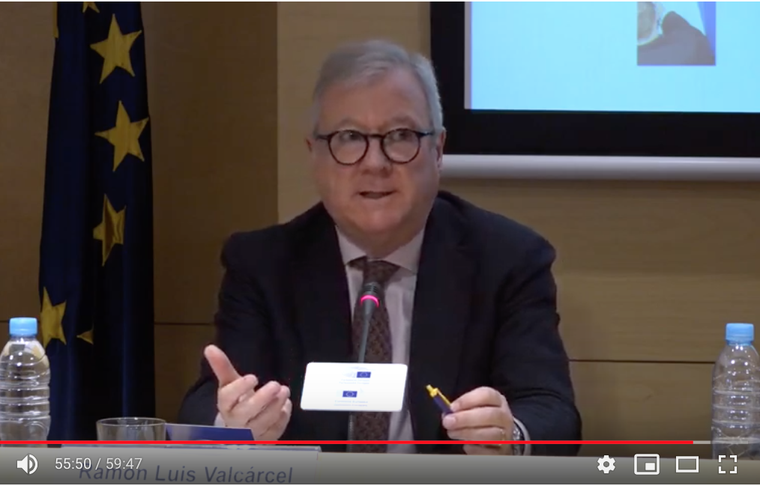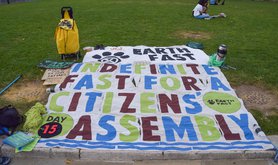
'#FakeYou: Fake News and Disinformation'
"We explain why we have published our report on monopolising the manipulation of information vs freedom of expression."

"Early in life I have noticed that no event is ever correctly reported in a newspaper, but in Spain, for the first time, I saw newspaper reports which did not bear any relation to the facts, not even the relationship which is implied in an ordinary lie. I saw great battles reported where there had been no fighting, and complete silence where hundreds of men had been killed. I saw troops who had fought bravely denounced as cowards and traitors, and others who had never seen a shot fired hailed as the heroes of imaginary victories; and I saw newspapers in London retailing these lies and eager intellectuals building emotional superstructures over events that had never happened.
I saw, in fact, history being written not in terms of what happened but of what ought to have happened according to various ‘party lines’."
George Orwell, "Looking Back on the Spanish War" - 1942
On 25 February 2019, as we were finalising our research on “fake news”, a conference at the highest level was being held at the European Parliament Office in Barcelona.
Speaking at the event was none other than the Vice-President of the European Parliament, also in charge of Information Policy, Press and Citizens Relations, as well as MEP of the Spanish Partido Popular (Conservative), the Honourable Ramón Valcárcel. Title of the conference: “Disinformation and European elections”.
Attendees were treated to the spectacle of a representative of one of our country's most prolific producers of fake news, the Partido Popular, offering a speech loaded with patronising bonhomie about some terrible external enemy and urban pop myths on the evils of technology. Of course, none of this was backed up with corroborating facts or evidence. The MEP reached a simple, practical conclusion which can best be summarised as: “Given this new danger of disinformation and fake news, for your own sake, we need to ‘regulate’ freedom of expression; consensually, of course”.
“Given this new danger of disinformation and fake news, for your own sake, we need to ‘regulate’ freedom of expression; consensually, of course”.
[Check the video for yourselves here. You may notice that the questions asked by activists at the end of the talk have been cut out, questions that called the speakers out on the disinformation underlying their speeches. Though it is a shame these questions have been cut, we are certain that they have been censored for our own good].
We can only thank the honourable MEP for handing to us on a plate with his conclusion the clearest justification for the 158-page report we have decided to publish: in short, that the fake news ‘phenomenon’ is being used as an excuse to curtail fundamental freedoms and rights.
Fake news is far from a new phenomenon. We are also historically well used to the monopoly on manipulating information using fake news as an excuse to pursue laws that curtail freedom of expression and information and criminalise the use of technologies such as the Internet.
But the democracy we aim to build is one in which the organised public monitor the actions of their rulers, not the other way around. This requires, among other things, transparent, verifiable, full and reliable access to information.
Our report aims to serve as a tool to defend us against the curtailment of our fundamental freedoms and, at the same time, to act as a weapon against new forms of manipulation, lying and fabrication. We have gathered research and provide data that dismantle the myths on which this new wave of freedom-slashing legislation is built. We oppose to it recommendations for laws to tackle the problem at its root, attacking the discourse of the hegemonic media and its propaganda.
Infantilising banality
Mr. Valcárcel is probably not even a bad guy. His point of view is just absolutely banal. It is the dominant view: political parties and governments are the knowers of the truth, and their task is to protect citizens from themselves (deep down we are like children causing mischief by misusing our freedom of expression) and from their enemies (today it’s “the Russians”, tomorrow, it could be anybody else).
If we examine the data, however, we soon see the opposite is true: since the dawn of time, the ones truly responsible for creating and spreading fake news and disinformation have been our governments, political parties, mass media and powerful corporations; or their equivalents in each historical era. The reason behind this is a simple one.
We – the people– are not necessarily good by nature. Humans – and the same is doubly true for politicians– find pleasure in processing information that backs up their own beliefs, however implausible. In fact, scientific evidence suggests that behaviour that we are now told is self-destructive and irrational may, at some point in our history as a species, have played a role in helping us to adapt.
It is not out of some inherent goodness or moral excellence that ordinary citizens have no impact on the creation of hoaxes. The truth is that in order for such hoaxes to reach a massive distribution, means are needed, and the public does not have access to those means.
Given the lack of such means, freedom of expression and access to information have proved to be the only viable instrument for uncovering the systemic and systematic lies pushed onto us by these large producers.
More democracy
As we prove in our report – with corroborating data – if we want less disinformation we need more and better democracy and less technophobia and criminalisation of freedoms; more accountability and verification and less impunity, uninformed paternalism and monopoly over the media and information resources. In short, we need demo-cracy, an empowered public that monitors and stands watch over what power says and does.
Having said this, since 2017 the term “fake news” has practically taken on the connotations of war. The information produced is no longer exclusively the prerogative of governments and the mass media, or something that can be shaped through clickbait. In the context of modern-day “hybrid wars”, organisations such as the European External Action Service East Stratcom Task Force consider the production of this type of (dis)informational piece to be an essential tool. With the media stripped of their role as gatekeepers – either due to their own corruption or because the financial crisis deprives them of a large part of what independence they had, we can see how the legacy media compete for users through blogs and other similar channels.
There is a clear struggle for power that those in charge, the domestic and international powers that be, use to destabilise and advance their hegemony, turning the current context into a flow of ignorance of the new digital context mixed with good old-fashioned greed.
In addition to the traditional players in the dissemination of information, we now see large corporations dedicated to digital content. The digital environment itself, while democratising and diluting the information monopoly, has also fostered the emergence of very powerful new actors.
Joshua A. Tucker, Yannis Theocharis, Margaret E. Roberts and Pablo Barberá pose the question, in From Liberation to Turmoil: Social Media and Democracy– How can the same technology – social media – simultaneously give rise to hopes of liberation in authoritarian regimes and be used by those same regimes for repression? In the face of these apparent contradictions, the answer is that social media do give a voice to actors traditionally excluded from the political conversation by traditional media. However, while social media do democratise access to information, commercial and private platforms, they are not themselves inherently democratic.
Accepting this complexity, our objective is to tackle the situation both thanks to and in the name of freedom of expression and information. We must make progress in defence of the Internet and modify the current information monopoly by moving towards a different model. This must restore dignity to the journalistic profession by the public asserting democratic, distributed and open control of institutions, in this case those that "produce" information.
This must restore dignity to the journalistic profession by the public asserting democratic, distributed and open control of institutions, in this case those that "produce" information.
Distributed verification
If we wish to preserve basic freedoms, we must not flirt with analysis of content or attempt to define what is true and what is false.
Our strategy is that of “follow the money”: by focusing on profit, we can penalise payments and charges that are made in exchange for publishing and spreading information without the necessary guarantees in terms of truthfulness.
It should be highlighted that "new technologies" place first-degree verification mechanisms such as searching in Google or other search engines within everyone's reach. As never before, distributed verification is now a real possibility, a tool that democratises – at least in part – verification of the "truth", something that until now was in the hands of just a few.
Fake news is most damaging not when contrasted with other, more or less true information, but rather it is most dangerous when its impact is massive. This happens when there is financial investment and when profits are generated.
In light of this analysis, we propose a clear direction to follow:
Firstly, we need to create a regulatory framework that dismantles the disinformation business, in order to bring an end to the impunity of the major manufacturers and viralisers of fake news and disinformation (governments, political parties, mass media and corporations).
Secondly, or rather, in parallel, since the Internet allows distributed access to tools, we must aim to clean up the information ecosystem through transparency and open, distributed verification that is already practised in several online communities.
Any initiative that involves delegating confronting false news to the few, be it through a government body or a company, carries a very real risk of curtailing fundamental rights, especially in the current European context of democratic regression.
In order to reach these recommendations, the report devotes several chapters to analysing various fields from a holistic perspective and checking out the veracity of some absurd commonplace assumptions.
We look at how the notions of fake news and disinformation are being defined and we discover the great effort from governments, parties and mass media to save their skin. We see how instead of fighting the monopolistic business of the corporations in this sector, networks and "technologies" are criminalised and people are persecuted for exercising their rights and liberties, in an attempt to perpetuate the asymmetry of the pre-digital era between citizenship and big media.
Then in "A brief history of fake news, information manipulation and disinformation", we take a journey from the Neolithic to the present day to show that the very idea this is a "new phenomenon" is in itself an example of fake news.
The heart of the beast and self-reliance
In this way we enter fully into the heart of the beast. In the section, “The big producers and viralisers of fake news and disinformation and the disinformation business: political parties | governments | mass media | corporations | communication businesses” – we have compiled examples of the huge investment political parties and governments make in the mass disinformation industry. We are talking about “producers”who don’t even feign the courtesy of half measures; as we shall see, this is an industrial-scale set-up.We will also see how national bot factories work and how we needn't fantasise about far-off Russia to understand how it is used every day by the political class both here and abroad.
After that we look at the invaluable tools and experiences that exist to help us verify information. We do so fully aware that at this stage of democracy, verification of information is not a majority practice among the population. Thousands of years of information dependence can only be countered by a protracted implementation period of this type of mechanism and by fostering within our societies a sense of self-reliant responsibility and holding ourselves to account .
Verification of the veracity of information is no longer a monopoly of journalists: from peer reviews in the scientific field to the moderation of online communities such as Reddit, we can already see a proliferation of such initiatives. Given how traditional mainstream media are increasingly abandoning their responsibilities in this field, we advocate broadening the mix between professional models and distributed structures of moderation and verification.
Finally, we have analysed the existing legal framework to shape our normative recommendations, so that the issue of fake news and disinformation can be tackled without prejudice to fundamental rights such as the right to freedom of expression and access to information.
Countering censorship
In almost all of the draft legislation in this field, we see paternalistic models that open the door to complex forms of censorship. We aim to oppose them with proposals and recommendations that are democratic and actually effective. As of today, we will defend them in all fora and all parliaments, until we achieve a change in narrative.
The fight against disinformation will be won by ending the monopoly of lies and achieving the distributed empowerment of citizens based on their right of access to information and the exercise of freedom of expression.
Our recommendations are as follows (yes, we will dare to touch the untouchables and it will be unprecedented, but at Xnet, we look to the future)!
As we have already said, it is clear that disinformation and fake news must be tackled:
1) by holding to account "big producers" (governments, political parties, mass media, corporations and companies whose activities have an impact on more than 10% of the population) and making the business of viralising disinformation unfeasible;
2) by expanding the surveillance and verification capacities of the public, through protocols of transparent access to information and knowledge about how such information is constructed.
Firstly, the duty to verify information must be adapted and specified as applying to all these agents, to all influential players that disseminate information offline or online, and those who offer communications services, including authorities and political parties.
We believe that the obligation of verification should be an imperative for all "influential information providers", and a failure to do so should be strongly penalised. We understand "influential information providers" to be any natural or legal person who has great power to disseminate certain information (including governments, political parties, mass media, corporations and major brands); and we understand this obligation must be an imperative when the dissemination of that information occurs as a result of a payment (such as advertising, for instance).
In this case, the following information should be published together with each piece of content:
- Traceability, reliability and detail of all sources and data used, in contrast to at least one alternative source. In the case of sources, they should indicate the ranking of truthfulness according to whether the source is perceptive (what the journalist sees with his or her own eyes or through someone who has transferred this information to them); is a social construct (data that, while true, is based on conventions, such as GDP and related calculations or the promises of a politician, which cannot be verified); is an inference (the transition from concrete data to conceptual data); or is modalised (data that has been "cooked" or adapted to be consumed, e.g., a survey or information dossier) and their sources ("influential information providers") can never be considered sources of information and copied as if they were, and all these parameters must be included in a transparent way
- Motivation for the exclusion of other notorious parameters to avoid the "cherry picking" effect
- Motivated linguistic analysis of associations of ideas not supported by any empirical data
- In quoting statements, review of whether they match the actual data
- Verification of hypotheses with a multiplicity of cases, thus avoiding making the anecdotal the norm
- Obligation of internal peer reviews. This should be detailed and include at least one author, one editor and several reviewers
- Self-assessment of the reliability of the information obtained
Also, in terms of sponsored information:
- • Identification of sponsors and promoters of those divulging electoral, political or general interest content
- • Amount spent
- • Criteria for selecting the addressees of the communication in question
- • Geographical source of the advertiser
- • In the case of justified exceptional circumstances where there is a risk for the party in question, the application of these measures may be waived, in whole or in part
- • When contracting the advertising, the advertiser must provide this information to the provider of the communication services so that it may comply with its transparency obligations
Astroturfing (sending of information falsely claiming not to be related to the creators or beneficiaries of the message being sent) shall be penalised.
Other duties of general transparency that are obligatory and subject to sanctions:
- Indicate in detail the sources of funding and affiliations
- Indicate in detail the method of work and verification used, and the processes followed to establish the degree of veracity
- Agile rectification policy
- Transparency of algorithms: obligation to publish the exact protocols of automated operations and how our data is used
Finally and most importantly, all entities registered in the Registry of Political Parties (political parties, foundations and entities linked to them or dependent on them) will be obliged to publish detailed electronic and non-electronic communications expenses. This obligation should lead to greater precision regarding the communication services contracted by these bodies (including the content and cost of services contracted or created by their own team).
Some of our recommendations may seem aggressive, unprecedented, or both. We are sorry, but it should be known that they are in alignment with the Joint Declaration on Freedom of Expression and “Fake News”, Disinformation and Propagandaby the UN Special Rapporteur on Freedom of Opinion and Expression, the Organization for Security and Co-operation in Europe (OSCE) Representative, the OAS Special Rapporteur on Freedom of Expression and the ACHPR Special Rapporteur on Freedom of Expression and Access to Information.
The report ”#FakeYou: Fake News and Disinformation – monopolising the manipulation of information vs freedom of expression” was published with the support of the Andrew Wainwright Reform Trust. Coordinator Simona Levi
The report is at the moment in Spanish, open to peer review.
Read more
Get our weekly email





Comments
We encourage anyone to comment, please consult the oD commenting guidelines if you have any questions.